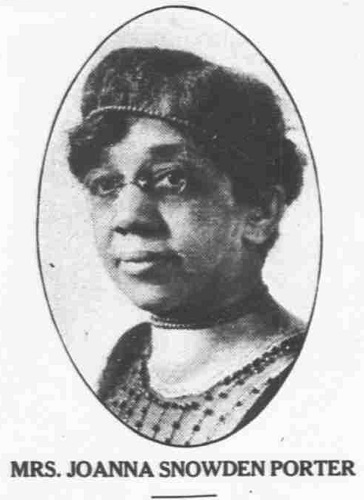Biographical Database of Black Women Suffragists
Biographical Sketch of Joanna C. Hudlin Snowden Porter, 1864-1941
By Alison McCann
Graduate Student, Roosevelt University, Chicago, Illinois

For over thirty years, Joanna Snowden Porter encouraged African American women to work for racial uplift and economic independence. Snowden Porter is best known as the founder and president of the Northwestern Federation of Colored Women's Clubs. She was born, Joanna Cecilia Hudlin, in Chicago, Illinois on February 14, 1864 to Joseph Henry Hudlin and Anna Elizabeth Lewis Hudlin (The family surname appears as both Hudlun or Hudlum). Joanna's parents were among Chicago's first Black settlers, commissioning the building of a home in 1857. In Chicago, Joanna Cecilia grew up with one sibling, Mary Louise Hudlin Watkins (born in 1862, and died in 1926).
After graduating from Englewood High School, Joanna Snowden attended Chicago's Bryant and Stratton Business College. On June 2, 1884, at the age of twenty, she married Samuel R. Snowden, a saloon owner. Two years later, the couple's only son, Joseph Edward, was born. After eighteen years of marriage, Joanna and Joseph Snowden separated; later, they divorced. From 1905-1906, Joanna Hudlin Snowden, at the age of forty-one, enrolled in the Institute of Social Science and Arts, which became the Chicago School of Civics and Philanthropy. Joanna Snowden became Joanna Snowden Porter in 1913 after her marriage to James Hale Porter, a well-known lawyer in Chicago.
Snowden's advocacy for Black women ranged from private charitable positions to paid political work for the City of Chicago. In 1897 Snowden was one of the three founders of and financial providers for a Home for the Aged and Infirm Colored People, one of the first social welfare facilities in Chicago. She served on the board of directors for the Home. She was treasurer for the Phyllis Wheatley Home for Colored Girls. Moreover, she worked for the City as a juvenile probation officer, as bookkeeper for Chicago's Recorder's Office, and as an officer of the Juvenile Protective Association. She was the only African American officer assigned to work in a predominantly Irish-American district. As a representative of the Chicago Federation of Colored Women's Clubs, Snowden Porter was one of the leading activists for the establishment, in 1916, of the Chicago Urban League She represented local club women at the charter session for the League and served as a member of its board of directors.
In 1920, with the national presidential election pending, Joanna Snowden Porter, who held a prominent position in the Colored Women's Department of the RNC, worked diligently on behalf of the National Republican ticket. She emphasized involvement of more African Americans women in national party politics. In December 1920, at the Northwestern Federation of Colored Women's convention, held in Phoenix, Arizona, Snowden Porter, as president of the organization, proved herself to be a strong supporter of and advocate for community collectivity by stressing the need for community ownership and responsibility. She also addressed such odious problems as lynching and mob violence. She encouraged delegates to speak out politically, urging their congressmen to work for racial justice for all Americans.
Joanna Snowden Porter died October 1, 1941 at the age of seventy-seven.
Primary Sources: Historical American Newspapers
"The Bi-Ennial Meeting of the Northwestern Federation of Colored Women's Clubs," The Appeal, June 7, 1919, http://chroniclingamerica.loc.gov/lccn/sn83016810/1919-06-07/ed-1/seg-4. "Third and Last Call to the Bi-Ennial Meeting . . .," The Library of Congress--Chronicling America--The Appeal--June 14, 1919--Image 5.
"Colored Women Conclude Meet: Elect Officers," Grand Forks Herald (Grand Forks, N.D.), July 4, 1919, http://chroniclingamerica.loc.gov/lccn/sn85042414/1919-07-04/ed-1/seg-6.
"Colored Club Women Meet in First Session," Arizona Republican, July 19, 1921, The Library of Congress--Chronicling America--Arizona Republican--July 19, 1921--Page PAGE, TWELVE, Image 12.
"Federation Told of Her Work with Boys and Girls," Arizona Republican, July 21, 1921, The Library of Congress--Chronicling America--Arizona Republican--July 21, l921--Page PAGE, SEVEN, Image 7.
"Two Phoenix Women Honored by Colored Women Federation," Arizona Republican, July 22, 1921, http://chroniclingamerica.loc.gov/lccn/sn84020558/1921-07-22/ed-1/seg-5.
"Snowden-Porter Wedding Solemnized at Famous Hudlin Residence" The Broad Ax, November 8, 1913, The Library of Congress--Chronicling America--The Broad Ax--November 8, 1913--Page 2 Image 2
"The James Hale Porter Campaign" The Broad Ax, September 11, 1920. The Library of Congress--Chronicling America--The Broad Ax--September 11, 1920--Page 6 Image 6
"Highly Interesting Review of the Important Work Performed by the Colored Women during the Recent Presidential Election . . . Contributed by Mrs. Joanna Snowden-Porter . . ." The Library of Congress--Chronicling America--The Broad Ax--December 25, 1920, Christmas or Holiday Edition--Page 3, Image 3.
Secondary Sources:
Floris Barnett Cash, African American Women and Social Action: The Clubwomen and Volunteerism from Jim Crow to the New Deal, 1896-1936 (Westport, Greenwood Press, 2001): 121.
Brian Dolinar, ed., The Negro in Illinois: The WPA Papers (Urbana, University of Illinois Press, 2013):173.
Anne Meis Knupfer, Reform and Resistance: Gender, Delinquency, and America's First Juvenile Court (New York, Routledge, 2013): 62-63.
Anne Meis Knupfer, Toward A Tenderer Humanity and A Nobler Womanhood: African American Women's Clubs in the Turn-of-the Century Chicago (New York: New York University Press, 1996): 24, 62, 69, 78, 84, 86, 137, 154.
Elizabeth Lindsay Davis, The Story of the Illinois Federation of Colored Women's Clubs (New York, G. K. Hall & Company, 1997): 33, 53,
Lisa G. Materson, For the Freedom of Her Race: Black Women and Electoral Politics in Illinois, 1877-1932 (Chapel Hill: University of North Carolina Press, 2009): 83, 115, 127-28, 209, 210, 212, 263 (n. 118), 269 (n. 20), 274 (n. 79), 290 (n. 116), 291 (n. 122).
Sylvia Hood Washington, "Mrs. Block Beautiful: African American Women and the Birth of the Urban Conservation Movement, Chicago, Illinois, 1917-1954," Environmental Justice 1, no. 1 (2008):19, http://doi.org/10.1089/evn.2008.0505.
Links to Additional Biographical Sketches
The Story of the Illinois Federation of Colored Women's Clubs
Related Writings in Database
